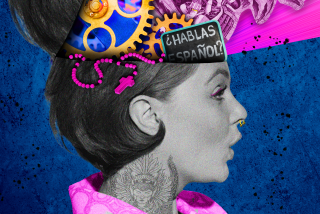The Mysteries of Latin
Not so long ago, Latin was part of everyday life. It was the incomprehensible but attractive language of the Western church and its music, the language of memorials and tombstones, and of doctors’ notes. It was the language of instructions to (human) printers--”stet,” for example--and of advertising. We ate Hovis bread (hominis vis, “the strength of man”) and cleaned the bathtub with Vim (vis, “strength”). Latin was part of things, mostly not understood but entailing respect for history and arcane scholarship.
To a modern sociological eye however, the dominance of Latin looks like so much humbug. Few moderns ever mastered it, even in the Christian Church, doctors used it to hide information from patients, or, as in Moliere’s comedies, cover their own incompetence. Slimy savants used Latin to have sly fun talking about sex without being caught or losing dignity. Freud notoriously talked about seeing “matrem nudam.”
The Paris-based scholar Francoise Waquet warms to the idea that Latin was one way or another mostly a conservative social conspiracy. For too long, it entailed a privileged background. It wasn’t taught to lower class children, however gifted. Meanwhile, in a tradition of gross hypocrisy, Latin scholars were expected to do badly. It was de rigueur to fail. Western society only required of its ruling classes that they come into contact with Latin. The question I asked myself while reading this detailed, and wide-ranging, but not quite engaging study, was two-fold: What has been gained by “unmasking” Latin, and has anything superior replaced it?
Latin was a sign of universality when people believed the West was the universe. But it was also convenient that educated men from different countries had a common language. For several centuries international diplomacy was conducted in Latin (conferences in Latin were still proposed in the early 20th century). The universality of Latin suggested potential unity and peace. The Jesuit diplomatist Joseph de Maistre called the surviving language of the Romans “the European sign.” Until the 1950s, across the world projects for an easier universal language like Esperanto were still based upon its lexicography and simplified grammar. English has stepped into the breach, but surely not with the same neutral and exalted status.
The supremacy of English seems more like the result of a marketing drive. The grouse against Latin in modern education was the combination of its difficulty and increasing irrelevance. When, as a small boy, Churchill famously queried the second case in the declension “mensa mensa mensam,” he was told its use was vocative. His reply, “But I rarely need to address a table, sir,” earned him a sharp rebuke, whereas today it’s what the teachers also think.
Doubts had already arisen in the 18th century as to whether this tongue that no one had ever heard was worth pursuing. But as I was told in school, Latin was there to train the mind and expand the vocabulary and provide a foundation for the love of literature, and while education had no finer purpose than these things, Latin wasn’t a bad vehicle. At least we could understand grammar, and inflected grammar at that.
Waquet identifies three defining moments between the 16th and the 20th centuries: the assured age of Latin’s monopoly, the 19th century age of grandeur and the post-1968 age. In the age of grandeur Latin was treated like royalty and religion, its exclusivity relentlessly cultivated in a already society defensive of its class privileges. Had Waquet not been French she might have cited the tragedy of Thomas Hardy’s “Jude the Obscure,” whose hero is kept by his lowly origins from studying at Oxford, though he had taught himself Latin and loved its very sound coming from beyond high, forbidding college walls.
Instead Waquet tells us that the French Revolution left Latin in a strengthened position. It gave the consolation of tradition. Few minded that they did not understand it. Initiating the contemporary age Oxford and Cambridge dropped their Latin entrance requirement in the mid-1970s. It rapidly declined to a minority option at school.
Barely 150,000 students across the United States now study it, and the figures aren’t much better for Europe. In France, Latin became an option in secondary education in 1968, with a decree from the conservative minister of education, Edgar Faure. The end of Latin and the 1968 student revolutions were surely part of a wave of liberalization happening out of anyone’s individual control.
Waquet’s book is part of the ongoing demystification and democratization process.The English public school with its top-heavy Classics curriculum is anathema. Latin always attracted chancers and fakers. “Upper-class” speech was peppered with intimidating and obfuscatory Latin phrases. Some of what she says is true, and still true.
But what Waquet misses for me is a sense of the tragedy that befell classical education in the few decades when it became open to allcomers on merit. This great wave of desire to learn rose up and carried with it many talented, diligent “ordinary” people whose lives were transformed by love of scholarship. Waquet records a 1969 statistic for a Welsh town--by coincidence my hometown for a year when I was still at school--stating that Latin teachers in schools were now almost all from lower-middle class backgrounds. What she doesn’t record is how the wave of enablement all too soon overturned when it smashed against a newer impulse toward social leveling. Latin went within a couple of decades from being a tool of enablement to a means of cultural undoing.
Was it somehow repressive? Latin was mysterious, but so is science to most of us. We take it on trust that it’s relevant. That the Latin mass generated fear and mystery in an ignorant congregation doesn’t for me make the case against Latin. Modern advertising and party political discourse are more manipulative discourses. Moreover, neither of them have the advantage of beauty and poetry, which provided a mass aesthetic education when the majority were churchgoers.
After World War II the Italian writer and Auschwitz survivor Primo Levi was walking back to Italy from Poland.Tired and starving, he met a priest, who spoke neither French, or German, or Italian. Ubi est mensa pauperorum? Levi asked. Where is the table for paupers? The West had almost destroyed itself, but in a few words the cultural hope it had nourished for centuries was reborn.
More to Read
Sign up for Essential California
The most important California stories and recommendations in your inbox every morning.
You may occasionally receive promotional content from the Los Angeles Times.










